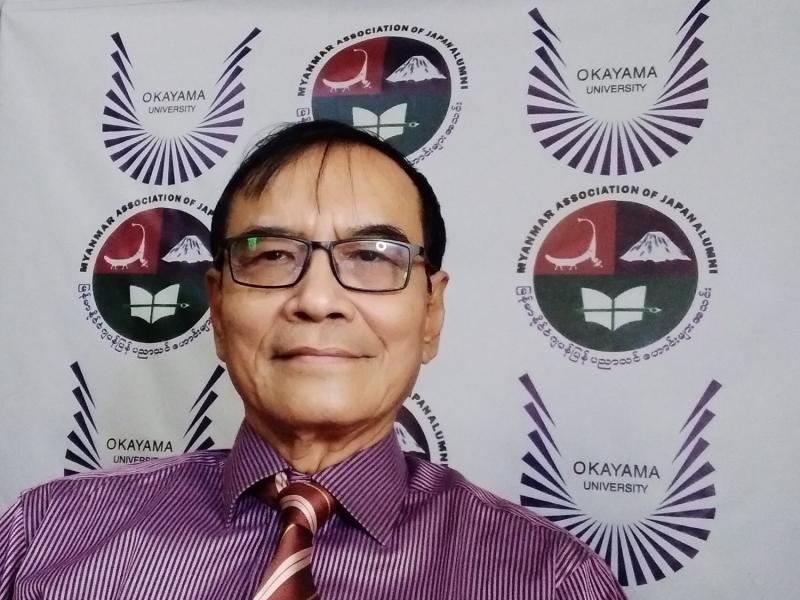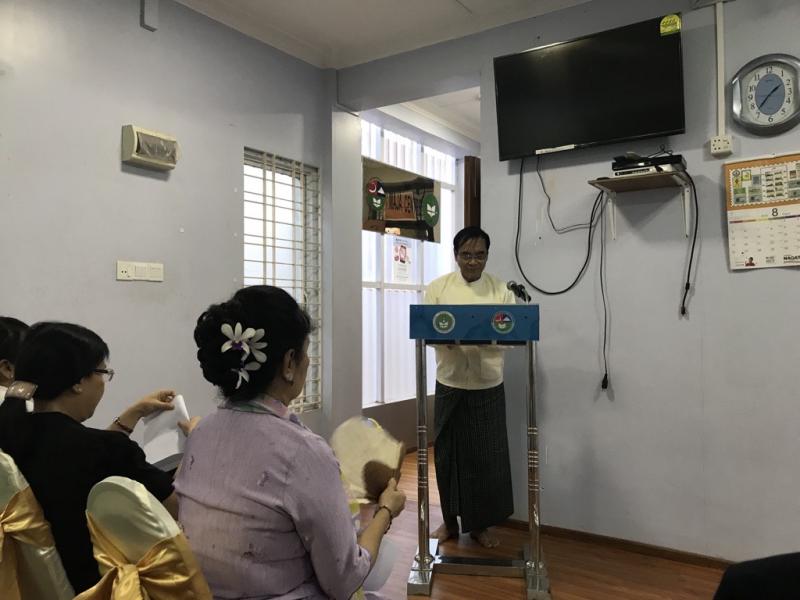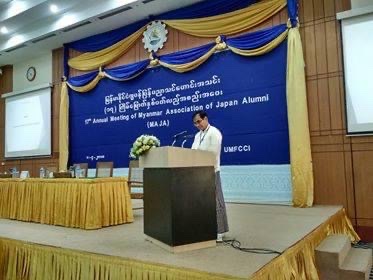日本の皆様へ
ミャンマーよもやまばなし
2020年12月08日
第6回 岡山大学、岡山大学国際同窓会(OUIAA)、ミャンマー元日本留学生協会(MAJA)と私の軌跡
Myo Khin(ミョー キン)ミャンマー元日本留学生協会・岡山大学国際同窓会 会長
私が中高生だった頃、長期休みの際はいつも私の父が働いている場所へついて行っていました。父はエンジニアで、当時のビルマ連邦政府(現ミャンマー連邦)電力供給委員会の水力発電局責任者でした。父はいくつかの任務を任されていましたが、主な責務は、ヤンゴンより北西に位置するカヤ-州ローピタでのプロジェクトでした。私たちはいつも陸路か、輸送機に搭乗できる機会があれば空路で現地へ移動していました。ローピタには多くの技術者がおり、彼らは、ラングーン(現ヤンゴン)やマンダレーのような大都市に電力を供給するための大型発電所を建設していました。後で知ったことですが、その計画にはビルマの他の地域への電力供給も含まれていたそうです。青年であった私は、大戦中に京都帝国大学へ留学していた父が、日本の技術者たちとともに、ミャンマー中に電力を供給できる国家になるように支援するため、ビルマで働いていることに感銘を受けました。
私の父は、機会があればいつも、日本で過ごした日々について語ることが好きでした。学問の話や日本語の話だけでなく、日本人の日々の生活や日本の文化についても話してくれました。父の日本での生活にとても興味をそそられ、若かった私は、父が私に話してくれたことを自分の目で確かめるために、いつか日本に行こうと決意しました。

その後、私は医者となり、感染症専門の研究者となりました。私はいつも、日本へ留学する事を夢見ていましたが、数年経ってもその夢は叶いませんでした。それでもなんとか、アメリカやオーストラリアへは留学することができましたが、日本への留学はまだ実現していませんでした。転機が訪れたのは1999年。私は岡田茂教授率いる岡山大学の科学者達と働く機会に恵まれました。そして、2004年、私は、国際協力機構(JICA)から、岡山大学へ留学する為の支援を得ることができ、とうとう日本留学という私の夢が叶いました。言うなれば、この出来事は、岡山大学とミャンマー保健省医学研究所(後に私が局長へ就任)の強力な協力関係の始まりでした。
私は、岡山大学との人材育成や研究プロジェクトに携わっていました。そして、退官後も、岡山をベースとする、日本・ミャンマー医療人育成協会のミャンマー支部長を務めており、ミャンマーの医療人材育成を促進するために10年以上に渡り保健省と協力しています。この25年間で、100人以上の研修生が岡山へ、また、岡山大学からも多くの専門家がミャンマーへ渡航しました。近年、この協力関係は医療分野のみにとどまらず、特に工学や経済、日本語の分野での協力に広がってきています。これらの学術分野における協力が実を結びの、2014年には岡山大学国際同窓会ミャンマー支部が、2018年にはマンダレー支部が設立されました。

ヤンゴンMAJA新事務所開所式
私自身は父親の足跡を辿って、2001年に父を含む49名の有志によって設立されたミャンマー日本元留学生協会(MAJA)へ入会しました。ほとんどの会員は、1943年から1945年の第二次世界大戦中に日本へ渡った元留学生で、「南方特別留学生」と呼ばれていましたした。余談ですが、偶然にも、私の義理の父も私の父と同じ時期に、座間の陸軍士官学校でトレーニングを受けていました。それから、私は2006年にMAJA役員になり、2017年より会長の役目を引き継いでいます。MAJAには現在2500名を超える会員がおり、市民・経済・社会・教育・文化的活動を推進しています。

MAJA総会
MAJAは日本留学を通じて得た経験を活かし、両国間の文化的・学術的関係を強化することを目的にしています。我々は、ASCOJA(アセアン元日本留学生評議会)の常設支部としての機能も有しており、その活動に全面的に参加したり、ASJA(Asia Japan Alumni:アスジャ・インターナショナル)と同じ目的に向かって、国を超えて協力したりしています。また、MAJAは、日本留学を希望する学生に助言や説明会なども行っています。さらに、ミャンマーの人々へ日本についての知見を、日本の人々へミャンマーの知見を広める教育活動も行っています。
MAJAは日本政府の奨学金について広報し、また、候補者の選考や教育セミナーの開催において日本大使館に協力しています。国際交流基金や日本学生支援機構(JASSO)と協力し、JLPTなどの日本語能力試験、日本留学試験(EJU)を実施しています。それから、ミャンマー日本商工会議所(JCCIM)、ミャンマー・日本協会(MJA)、日本ミャンマー協会(JMA)、日本語学校、そして、ミャンマーの日本人コミュニティと良好な関係を築いています。さらに、MAJAは、岡山大学とも深い協力関係にあり、ミャンマーにおける日本留学海外拠点連携推進事業の立ち上げや岡山大学日本留学情報センター(OJEIC)のヤンゴン事務所とマンダレー事務所の開設などに関わっています。これらのセンターでは、留学に関心のある学生達が日本の大学の情報を収集し、個別相談などができる場となっています。
研究者であり、教育分野の啓発者である私としては、MAJAとOUIAA(岡山大学国際同窓会)こそが、「ミャンマーの若者がこれからの時代のリーダーになるための教育」を促進する手段であると考えています。
岡山大学国際同窓会マンダレー支部開所式
最後に、岡山大学がこれからも努力を惜しむことなく全ての留学生に対して優れた質の教育を提供し続けることを、そして、日本とミャンマーの人々の友好関係がいつまでも続くことを願っています。
2018年の留学フェアにて、岡山大学 槇野学長と
原文:Okayama University, OUIAA, MAJA and Myself
During my secondary school years, whenever there was a long holiday, I used to follow my father to his project sites. My father was an engineer and he was the Head of the Hydroelectric Department of the Electricity Supply Board of the Government of the Union of Burma (now Myanmar). He had several responsibilities but his primary concern was the project at “Lawpita” situated in Kayah State, North West of Yangon. We used to travel by car and on certain opportunities on a transport plane. There were many engineers in “Lawpita” and I learned that they were building a power factory to supply electricity to big cities such as Rangoon (now Yangon) and Mandalay. I only later learned that the plan also included supply of electricity to several regions of Burma. Some of the engineers were Japanese and as my father had studied at the Kyoto Imperial University in Japan during the War time, he could speak Japanese and I as a young adolescent was inspired by the fact the Japanese engineers were in Burma to help my country to become a nation sufficient in electric power. Whenever he had a chance, my father liked to talk about the days he spent in Japan: not only on academic and language programs, but also on the daily life of the Japanese people and their culture. I was very much intrigued by his life in Japan and I, as a youngster concluded that I would like to visit Japan one day to see for myself what father had told me.
Later, I became a medical doctor and a researcher specializing in infectious diseases. I had always dreamt of studying in Japan, but even after several years, that dream never came true. I managed to study in the United States of America and in Australia, but my dream to study in Japan was still not fulfilled. In the year 1999, I had an opportunity to start working with the scientists from the Okayama University led by Professor Shigeru Okada. In the year 2004, my dream came true when I received a grant from the Japan International Cooperation Agency to study at the Okayama University. The visit, if I may say, is the inception of strong collaboration with the Okayama University and the Department of Medical Research (which I later became the Director General), Ministry of Health, Myanmar. I had been involved in several human resource development and research projects with the Okayama University. Even after my retirement, I am still involved as a Director of Myanmar Japan Collaborative Project for Medical Human Resources Development Project which is based in Okayama, and we have being collaborating with the Health Departments for more than a decade to promote the Medical Human Resources in Myanmar. Over one hundred trainees were sent to Okayama and several expert visits from the Okayama University have been organized during the past 25 years. In recent years, the collaboration has extended to other academic fields, notably engineering and in the field of economics and Japanese language. The successful academic collaborations had led to the formation of the Okayama University International Alumni Association, Myanmar Branch in the year 2014 and the Okayama University International Alumni Association, Mandalay Branch in 2018.
I myself, following in my father’s footsteps, joined the Myanmar Association of Japan Alumni (MAJA), an association formed in 2001 by 49 founding members, most of them who have studied in Japan during the Second World War years of 1943-1945. My father was also included as a founding member and they were regarded as the “Nanpotokubetsu Ryugakusei”. Coincidently, my father-in-law was also trained at the Military Academy in Zama during the same period as my father. I joined the MAJA Executive Committee in the year 2006 and I am now taking the helm as the President since 2017. MAJA promote and foster civics, economic, social, educational and cultural activities amongst it’s over 2500 members.
MAJA aims to maintain alive the experiences obtained in Japan and strengthen the cultural and academic relationships between the two countries. The Association also deals directly with ASCOJA (ASEAN Council of Japan Alumni) as a regular chapter and to fully participate in its activities and to cooperate with the ASJA (Asia Japan Alumni) internationally for mutually agreed purposes. MAJA provide advice and guidance to those students intending to study in Japan. MAJA also took part in educational activities promoting knowledge of Japanese among Myanmar nationals and knowledge of Myanmar among Japanese nationals.
MAJA advertises the scholarships awarded by the Japanese Government and collaborate with the Embassy of Japan in the selection of the candidates. MAJA also conducts Japanese Language Examinations such as Japanese Language Proficiency Test (JLPT) in cooperation with the Japan Foundation, Examination for Japanese Universities for International Students (EJU) in cooperation with JASSO and Education Seminars in cooperation with the Embassy of Japan. MAJA also maintains close linkages the Japanese Chamber of Commerce & Industry (JCCI) Myanmar, the Myanmar Japan Association (MJA), Japan Myanmar Association (JMA), the Japanese Language schools and the Japanese community in Myanmar. MAJA also collaborated very closely with Okayama University in the establishment of “The Study in Japan Project in Myanmar” and in the opening of the “Okayama University Japan Educational Information Centers” in Yangon and in Mandalay. The Centers have allowed interested Myanmar Students to collect information on several Japanese Universities. In addition, the Centers also provide individual consultations to students.
Personally, as a research scholar and an advocator of education, I strongly regard MAJA and OUIAA as vehicles for promoting “education to young leaders of Myanmar to become leaders of tomorrow”. With those words, I would like to wish success to the Okayama University for its relentless work to provide excellent education to all overseas students and wishing more and more years of friendship between the people of Japan and the people of Myanmar.
